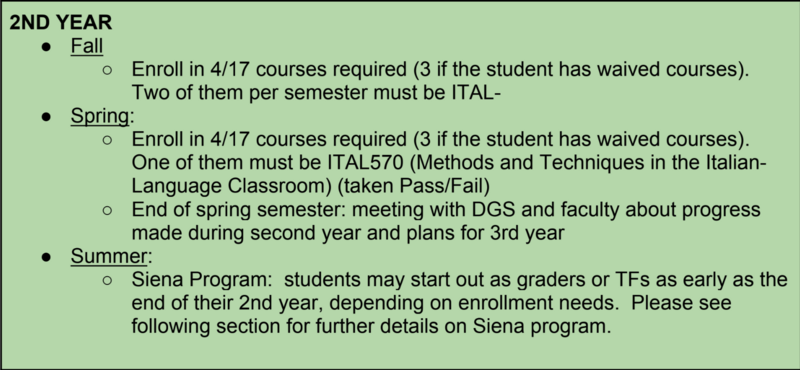TIMELINE TO DEGREE
Overview:
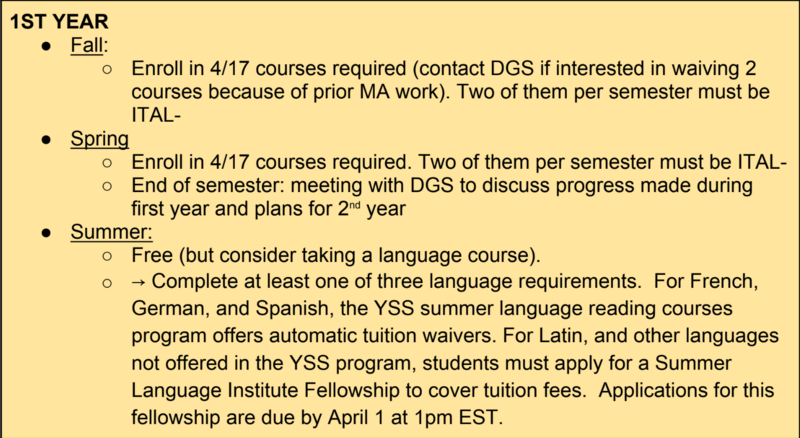

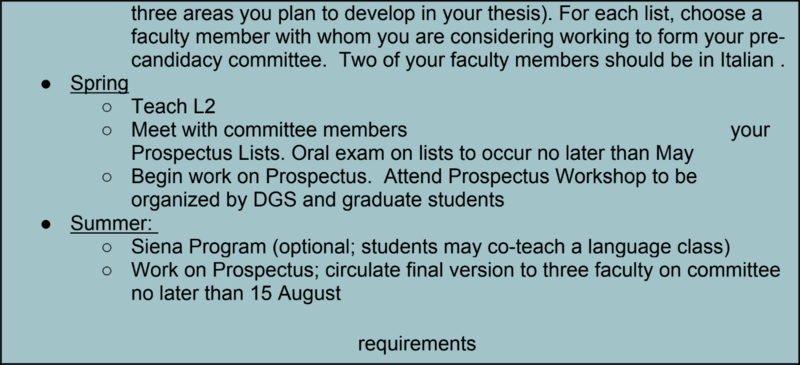
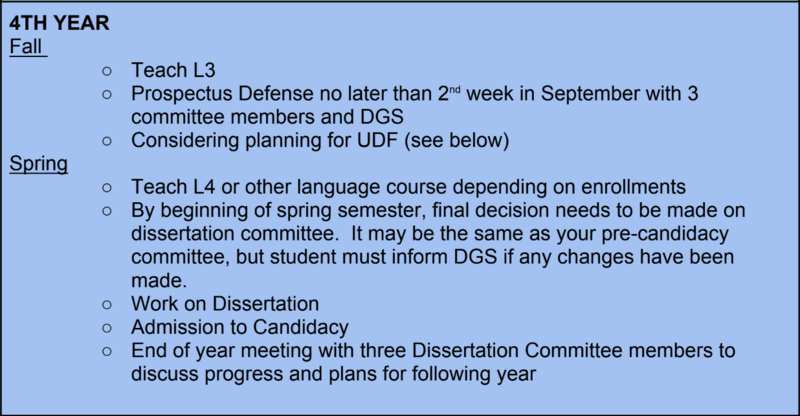
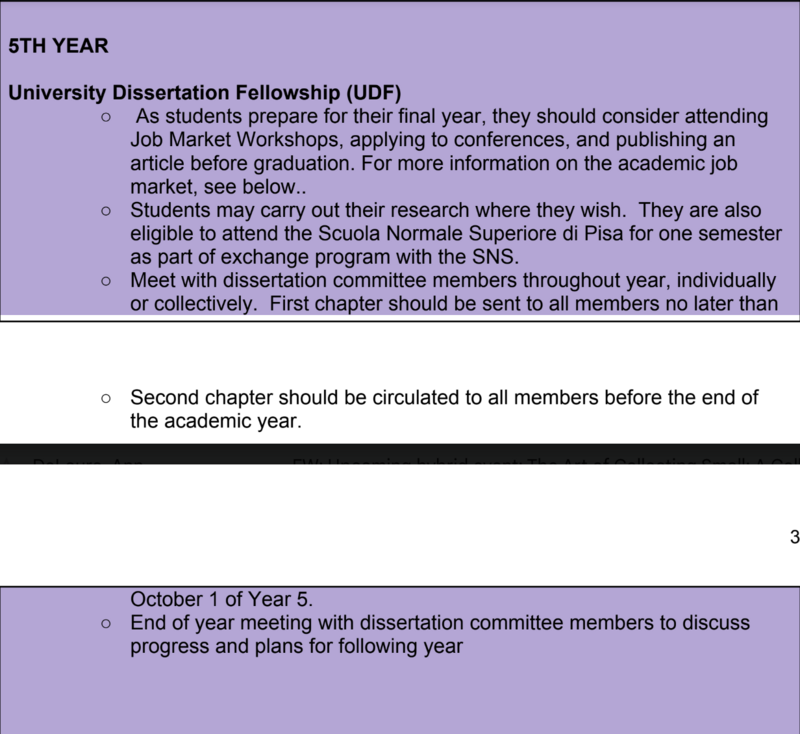
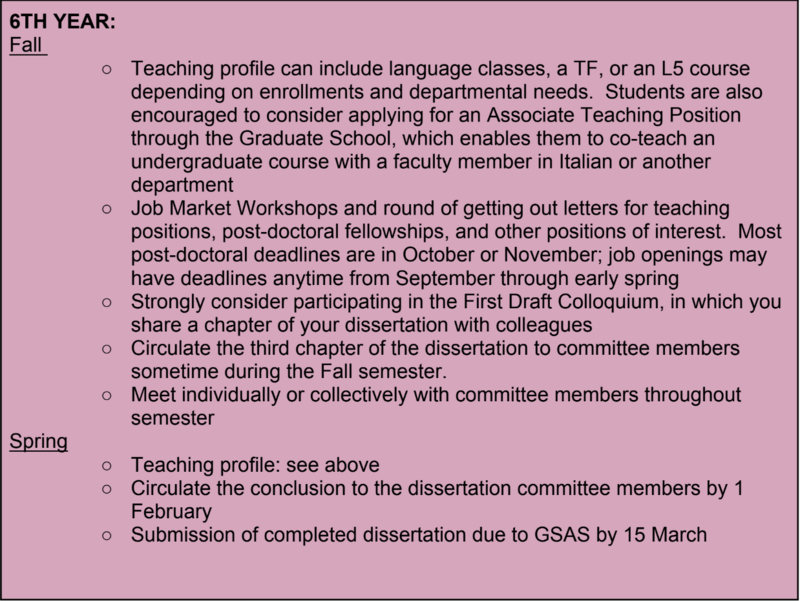
1-2 YEARS (COURSEWORK & REQUIREMENTS)
● 1st year
- Students are recommended to enroll in four courses per semester for a
total of eight courses completed by the end of the first year. Two courses
per semester must be based in or cross-listed with the Department of Italian Studies. - According to the GSAS Honors requirement, “students must
achieve the grade of Honors in at least one full-year, two-credit
graduate course or two one-credit graduate courses taken after matriculation in the Graduate School and during the nine-month academic year. The Honors requirement must be met in courses other than those concerned exclusively with dissertation research and preparation. A student who has not met the Honors requirement at the end of the fourth term of full-time study will not be permitted to register for the fifth term”. - In the event in which students are not able to submit course assignments by the course deadline, they may ask for a gradeof TI (“Temporary Incomplete”) by submitting a form (to be downloaded from http://gsas.yale.edu/forms). Following GSAS policy, only one TI is permitted per term, and TI grades must be converted to final grades by October 1st of the following academic year. If a grade is not received by that date, the TI will be converted to a permanent Incomplete on the student’s record.
- Students in the joint Italian Studies & Film and Media Studies program are required to complete 8 courses from Italian, 6 courses from FMS, and 2 courses from other GSAS departments. Students in the joint Italian Studies & Renaissance Studies program are required to complete 9 courses from Italian, 7 in Renaissance Studies. Of the nine courses in Italian, at least three courses would be devoted to the period from Dante to the earlier seventeenth century. The seven courses making up the“Renai ssance Studies” portion of the degree will be divided as follows: two terms of the Renaissance Studies core course; two courses in Renaissance literatures other than Italian, and three courses divided between at least two “non-literary” disciplines (e.g., History, History of Art, Religious Studies, etc.).
- Students interested in certificate programs (WGSS, Environmental Humanities, Second Language Acquisition) are encouraged to seek out requirements as soon as possible.
- Students entering the program with a relevant M.A. degree (e.g. an M.A. in Italian or a laurea magistrale) can elect to waive up to two credits. Courses can be waived in consultation with Department Registar and the DGS.
- Completion of at least one of three language reading requirements (one non-Italian Romance language, one non-Romance language, and Latin) is recommended. Reading requirements can be satisfied by one of the following two ways:
- ■ Successfully passing a written translation exam, the date of which should be arranged by the language department administering the exam. One date is generally offered per semester. For Latin, the translation exam is administered within the Italian department and scheduled individually, and excerpts to be translated (from Latin to English) are selected by Italian faculty.
- ■ Enrolling in summer reading classes and passing the course with a B+ or higher. Summer enrollment fees are automatically waived for GSAS students who take the classes for German,French, and Spanish. Students who choose to study Latin, or another language not included in the above list, must apply for the tuition waiver through the Summer Language Institute Fellowship (deadline April 1, 1pm EST). Upon completion of the course, you must email Ann DeLauro with a copy of your final grade on your unofficial transcript in order for the reading requirements to be registered on your academic record. (N.B. These reading classes do not count toward the required 17 credits and are therefore recommended to be taken during the summer.) Submit the app. to https://gsas.yale.edu/summer-language-institute-fellowship-application-yale-summer-session-courses
- At the end of the first year, there will be an informal one-on-one conversation with the DGS to discuss any questions or issues that have emerged, and to plan courses for Year 2
● 2nd year
- By the end of the second year, students should have completed sixteen
required credits and finished all coursework requirements with the exception of ITAL-999, “Preparing Doctoral Examinations.” - Completion of all coursework and the three language reading requirements qualifies students to apply for the M.A. degree in Italian Studies.
3-4 YEARS (COMPREHENSIVE EXAMS & PROSPECTUS)
● 3rd year
- The teaching requirement of the 3rd year is one language course per
semester: specifically, L1 during the Fall semester and L2 during the
Spring semester. - Students should take their final course in the fall semester, “Preparing Doctoral Examinations,” ITAL-999. The course is on a Pass-Fail basis and involves weekly meetings with departmental faculty and advanced graduate students to discuss the 5 Comprehensive Reading Lists (medieval/early modern/’600-‘800/modern and contemporary/critical theory).
- The Comprehensive examination should take place by the end of fall semester of the 3rd year. Students will have one week to write two essays (25 pages total) in response to questions about the lists. The essays must be submitted to all ladder faculty members of the department. The DGS will report comments and grade to students within a week of submission.
- During the intersession break students should construct their three Prospectus Lists in concert with three faculty members who will make up the pre-candidacy committee. Each list should consist of 15-20 works. The topics should be relevant to the student’s prospectus, and may focus on a specific critical methodology; a chronological period; a specific genre or medium; an individual author, filmmaker, critic; etc.
- No later than May 31, an oral examination on the lists will be held with the three committee members. The exam will consist of questions about the lists and plans for the prospectus.
- Over the summer, the prospectus should be crafted with the assistance of the three committee members and a final version submitted to them and the DGS no later than 15 August.
● 4th year
- The teaching requirement of the 4th year is one language course per semester. Specifically, L3 during the Fall semester and L4 during the Spring semester , depending on departmental needs; an L4 class may be replaced by a TF if necessary.
- No later than September 15, the student will discuss their prospectus, in a session with the three committee members and DGS. The prospectus should be 12-15 pages, with a bibliography of 3-5 pages, and should state clearly the 1) argument of the thesis and the critical question or problem it plans to address; 2) the scope of the analysis (major texts, films, cultural artifacts, historical moments); 3) critical methodology. A short table of contents of projected chapters should follow, with a brief summation of each chapter. Admission to candidacy must take place by the spring term of the 4th year.
- At this point, students are expected to choose the members of their dissertation committee. It may be the same as the pre-candidacy committee, or could change, in consultation with the DGS. Students may opt to add a 4 th committee member. At least two of the members must be Yale Italian Studies faculty. The 3 or 4 committee members will advise the writing process, and serve as the official readers of the final document. The student’s dissertation director will be among these committee members.
- PhDs in their 4th year of study and certified by their graduate program to be on track to submit the dissertation are eligible for UDF for the 5th year of study. Students must submit a Dissertation Progress Report once a semester from herein.
- UDF. The University Dissertation Fellowship (UDF) is available to students who have advanced to doctoral candidacy. After you advance to candidacy, you will complete the University Dissertation Fellowship form to indicate when you would like to receive the UDF. Students can spend their UDF in the United States or abroad. They may (but it is not required) also enroll as visiting students in other universities. The timeline for this process depends on the single university. Some of them require the payment of a fee (e.g: Oxford). Students are also eligible to apply to the exchange with the Scuola Normale Superiore di Pisa for one semester, where they receive library privileges and may attend classes. They should notify the DGS of their interest in the program no later than December of Year 4.
- Students who are planning to spend their UDF abroad might be interested in applying for the MacMillan International Dissertation Research Fellowship. It can provide up to $18,000 for the academic year and may be combined with other external or internal awards, subject to the Graduate School’s policies on holding multiple awards. The deadline for applying is generally early November for dissertation research to start during the Spring, and early May for dissertation research to start during Summer and next academic year. More information here: https://yale.communityforce.com/Funds/Search.aspx
5-6 YEARS (UDF & JOB MARKET)
● 5th year
- Students can opt to take their UDF during their 5th or 6th year, depending on personal preference.
- You must submit two chapters of the dissertation during this year.
- Recommendations: In anticipation of the academic job market, students should attend conferences and publish an article before graduation. Generally, students should attend one to two conferences per year from the 5th year onwards. Students should also aim to publish an article before graduation.
- Most conferences send out Call For Papers (CFP’s) in early to late Fall requesting abstracts for proposed papers. Students are notified by late Fall (December) of acceptance/rejection of their proposed paper. Conferences usually take place in March or April. The MLA conference has a different timeline.
- Students should speak to their committee members about the publishing process. Advisors with a similar specialty will be able to recommend peer reviewed and respected journals. Keep in mind that articles take anywhere from 9 months to 1 year from submission to the journal to publication. After the initial submission, the article manuscript will be reviewed by peer reviewers (this takes about 3 months). The journal will notify you of acceptance or rejection of the manuscript. If the manuscript is accepted, there will usually be edits required/recommended by the readers. You will then complete the edits and resubmit.
- As students aim to graduate by the end of their 6th year, they should begin to prepare academic job market materials in the Spring or Summer of 5th year. Deadlines for postdoctoral fellowships may be as early as August, a full year before the time of the appointment. Deadlines for tenure-track lines typically are in the fall (around October - almost a year before the time of the appointment), whereas announcements for applications for lecturers and visiting professorships may come up at any point in the academic year.
- The Graduate Writing Lab (GWL) at the Poorvu Center provides informative workshops on how to prepare academic job market materials. Though not specific to Italian, these workshops provide a detailed overview of each document’s content and structure. https://poorvucenter.yale.edu/writing/graduate
- Materials for the professorship market include: cover letter, CV, two or three letters of recommendation, teaching statement, research statement, teaching portfolio. Postdocs require more specialized materials. In addition to letters and CV, they generally ask for a proposal of a research project with a concrete timeline (this document varies greatly in length and requested content).
- Students should contact potential recommenders at least a month in advance to ask if they would be willing to write letters. Once the recommenders agree, students should provide their letter writers with a schedule of known deadlines. They should give them a minimum of 2 weeks in advance of each application due date.
● 6th year
- Students are guaranteed full stipend funding in their 6th year, provided that they are in good standing.
- The teaching requirement for 6th year is one course per semester, dependent on departmental needs and student interest. Sixth year students when possible are given priority for teaching a L5 course, to be designed in concert with and subject to approval by departmental faculty, or for a TF (teaching fellow) position. The L5 course is an advanced, discussion-centered language course that the student designs and teaches as the instructor of record. As a TF, a student assists a professor in lectures and discussion sections. Students are also eligible to apply to the Teaching Associates Program, which allows them to co-teach a course with a faculty member. This is a competitive program administered through the Graduate School.
- Recommendations: If students are on the academic job market, they should apply to conferences and aim to have an article published by graduation.
- If students do not wish to go on the academic job market, they should take advantage of the Office of Career Strategy, which offers workshops and tools like Career Link, and provides one-on-one advising at all stages of the job market process (from exploring possible career interests to preparing materials for specific job opportunities). https://ocs.yale.edu/
- 6+ Years
- While it is not encouraged, some students request a 7th year to finish their dissertation.
- Funding is not guaranteed during the 7th year, but rather is dependent on departmental need. If funding is obtained, it is no longer a graduate student stipend. Students will be compensated on the pay scale of an adjunct per course. Generally, student funding is cut in half, and there is no funding during the summer. Students do receive healthcare benefits during the academic year, but not over the summer between 6th and 7th year.
Keep in mind that the dissertation must be submitted in mid March for graduation in May. Once the dissertation has been submitted, readers have one month to submit a reader report, in which they approve or reject the dissertation, give recommendations, and comment on the dissertation’s quality and suitability for publication
■ Language courses and TF 20 positions (TF positions designated as 20 hours per week) pay more than TF 10 positions.
■ Students can apply to teach in Siena over the summer. This is an effective/essential means of supplementing income.
- If students do not get teaching in the 7th year, they must also pay a Continuous Registration Fee (CRF, which is, as of 2021, $750 per semester). If students do get teaching, this fee is waived.
